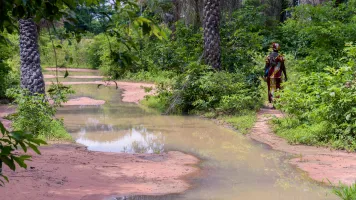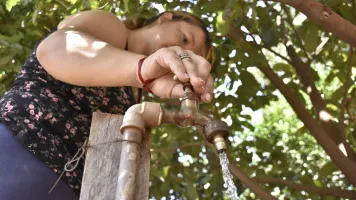Festival De Datos 2023 was the ideal place for data for development partners, including several government agencies, to network, collaborate and learn on a global stage. Togo's delegation, represented by Colonel Gouni Feyssal Moumouni, National Coordinator for the Project for the Improvement of the Environmental Information System of Togo (PASIET), embarked on a journey rich in insights, connections, and newfound opportunities that would significantly shape his work in government and data management.
Colonel Moumouni aimed to enhance Togo's environmental data management and learn from other countries' Nationally Determined Contributions (NDC) monitoring practices at the festival and eagerly anticipated the Data for Climate Change Workshop. In the midst of the action, he engaged in various additional sessions and workshops, connecting with organizations such as Humanitarian OpenStreetMap Team (HOT), Paris21, DataSketch, Sightsavers, the Collaborative on Citizen Data, and UNDP.
Cross-sector connections: Humanitarian OpenStreetMap Team (HOT) and Paris21
A significant outcome was the establishment of a connection with HOT, where Colonel Moumouni had the opportunity to speak with the Executive Director. Before attending the festival, Togo had already begun work on building the architecture for an environmental information system. Colonel Moumouni attended the festival with the specific intention of finding partners to assist in developing this system. His meeting with HOT representatives led to them developing a concept outlining how they would collaborate with Togo on their desire to create a remote environmental information system. Both parties are currently in the process of signing an agreement in order to begin their collaboration.
Another important connection was with Paris21. Prior to the event, Colonel Moumouni had been unsuccessfully trying to reach the organization through emails. At the festival, he met with a representative and discussed Togo's work on climate indicators and environmental challenges. Following this interaction, Colonel Moumouni was invited to Senegal to give a presentation on the data ecosystem related to climate change, at an event organized by the National Agency of Statistics and Demography (ANSD) of Senegal and Paris21.
Government-to-government knowledge sharing
His exchange with government officials from Guinea and Mali highlighted the power of networking created through Festival De Datos, with the potential for future collaborations and shared insights. Togo's active participation in government-to-government knowledge-sharing sessions opened avenues for mutual learning and collaboration.
By day two of the festival, some connections were made with Suriname, whose presentation became a valuable reference point for Togo, offering insights into tools and methodologies that could enhance their own data collection and reporting.
After attending a session where Paraguay presented on its water information system, Colonel Moumouni was able to identify gaps in Togo’s own reporting in this area, and was empowered to enhance Togo’s reporting by including crucial indicators on water collection and quality, contributing to a more comprehensive understanding of their national water resources. Paraguay's experience also clarified how they mobilized national funds to develop the database, which is particularly relevant to the environmental information system Togo is developing.
Peer exchange with Paraguay
Inspired by the knowledge gained at Festival De Datos, Togo requested a peer exchange with Paraguay to delve deeper into its water information system development, which the Global Partnership facilitated in early 2024. The peer exchange provided insights into the technical aspects, strategic importance, and implementation strategies employed by Paraguay in the successful development of the system. During the peer exchange, the need to integrate diverse environmental data sources was a primary focus, with the goal of creating a comprehensive management system that prevents duplicated efforts and ensures cohesive environmental strategies.
At the peer exchange, participants recognized technical and operational challenges, such as the integration of disparate data systems and the crucial role of metadata management. The meeting underscored the importance of three roles for successful system implementation: high-level coordination and stakeholder engagement, metadata and technical expertise, and programming skills to develop and manage the information management system. As a result of the peer exchange, Togo finalized Terms of Reference (ToR) for three key consultants who can manage the three roles discussed, is planning a donor roundtable to finance their recruitment, and is exploring potential collaborations with HOT and Center for Open Data Enterprise (CODE) for the development of the environmental information system. Both countries agreed to remain in consultation to enable Togo to gain further insights into how Paraguay developed its water information system.
Local capacity building
With support from the Global Partnership, Togo then engaged a local consultant of Geography and Spatial Informatics - Land Use Planning, Dr. Aimé Djongon, to support the executives of data-producing structures in the environmental sector. Dr. Djongon emphasized, "Data from various sectors are necessary to intervene in the field of environment, and the management of this data can be greatly facilitated by the implementation of appropriate database management systems (DBMS) and geographic information systems (GIS)." With this perspective, he worked towards improving their data management practices and facilitating the implementation of suitable DBMS and GIS.
The training sessions culminated in the development of three specific use cases, each addressing a critical aspect of Togo's environmental and developmental challenges and demonstrating the practical application of their newly acquired knowledge: 1) Analyzing agricultural price variations and their environmental impact in Togo using GIS and data management tools; 2) Enhancing public health decision-making through GIS-based mapping of health indicators in Togo, and 3) Evaluating the impact of the Irrigated Agriculture Master Plan (SDA) on agricultural productivity using GIS tools.
Conclusion
This experience showed us the importance of coming prepared, with concrete ideas, because every interaction can lead to a collaboration that transforms our approach to data management. For Togo, this wasn't just an event, it was the beginning of a new chapter in our journey towards sustainable development based on solid data.” ~ Colonel Feyssal Moumouni.
Reflecting on his experience, Colonel Moumouni found the organization of the festival to be excellent, despite the long travel time to reach the location. The connections made and lessons learned at Festival De Datos 2023, coupled with the subsequent peer exchange with Paraguay, have catalyzed progress in Togo's ongoing efforts to develop a comprehensive environmental information system. The festival has proven to be a pivotal moment in Togo's path, setting the stage for meaningful progress and showcasing the power of global knowledge sharing in driving sustainable development.
The data for development community will gather again at the United Nations World Data Forum in Medellín, Colombia, from 12-15 November, 2024. The Global Partnership is excited to join several sessions during the World Data Forum 2024, as well as hosting several side events. Here's where you can find us.

